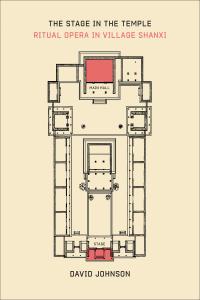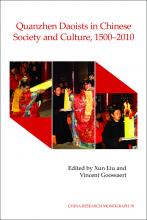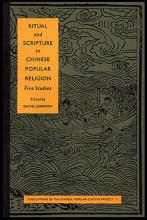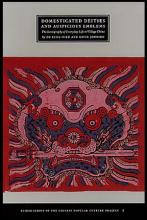The Stage in the Temple
The Stage in the Temple
David Johnson
Za Operas were offerings to village gods performed on temple stages during annual festivals. They first appeared in the eleventh century and were still performed in Shanxi villages in the nineteenth century. The Stage in the Temple discusses a number of old village scripts, reconstructs where and how village opera was performed, and considers the role of ritual opera in premodern rural Chinese culture.
As a nonprofit academic press, we need your support to publish our books. Your gift can help us make more of our titles available as e-books. DONATE NOW
Title information
Villages in China’s Shanxi province celebrated the birthdays of local gods with large festivals. The celebrations included solemn rituals performed in the god’s temple. They also included grand banquets of food and programs of opera. Temples in the countryside always included stages. The stages faced the statues of the gods in their great hall, who were the real audience, though villagers were also present. Both stage and great hall were in the temple compound, hence the title of the book. The operas were based on stories from Chinese history. Love stories, crime and punishment stories, and farces were not allowed. These ritual operas were called “Za Opera” in Shanxi and many other regions as well. Za Opera first appeared in capital and countryside in the eleventh century. As other operatic genres appeared in later times, Za Opera became strictly village opera. It was virtually ignored by educated town and city dwellers until recently. Hence it changed little and provides important information about the history of Chinese drama.
David Johnson
David G. Johnson is professor emeritus of history at the University of California, Berkeley. His research interests include premodern China and traditional Chinese popular culture. He is the co-author of Domesticated Deities and Auspicious Emblems (IEAS, 1992) and the author of Spectacle and Sacrifice: The Ritual Foundations of Village Life in North China (Harvard University Press, 2010).
A.B. at Harvard College; Ph.D. at the University of California, Berkeley
The Stage in the Temple
Introduction
1. Scripts of Za Opera
Five Scripts from Southwestern Shanxi
Three Scripts from Xinzhuang Village
2. History of Za Opera
Origins and Early Development of Za Opera
Early Stages in Shanxi
The Invisible History of Za Opera
Nuo Opera in Anhui: A Parallel Tradition
3. Village Opera in Performance
Za Opera
Yuanben
Dui Opera
Sai Opera
Tiao Opera
4. Questions and Conclusion
Appendix 1. List of Early Stages in Shanxi
Appendix 2. Note on the Authenticity of Our Scripts
Appendix 3. List of Za Opera Manuscripts
Bibliography
Glossary-Index
|
JOURNAL REVIEWS |
|
"The Stage in the Temple probes Chinese theatre history generally and Za Opera history particularly.... Johnson invites a reassessment of the interplay among performers, performances, and audiences as well as the function of theatrical performance in everyday village lives. Since Johnson also touches upon Chinese classical fiction, storytelling, and other opera genres including Clapper Opera, this book...appeals to a wider range of readers." ~ Yunjie Hu, University of Sydney, in Asian Studies Review 48, no. 1 (2024): 207-208 (DOI: 10.1080/10357823.2023.2266870) |
|
"By delving into the immense variation within the symbolic culture of Chinese villages, Johnson's work serves as a foundational research endeavor.... Notably, he posits that while rituals themselves are performances, they are heavily structured, hierarchical, nearly immobile, and symmetrical, controlled by the educated elite. In contrast, opera, in the hands of ordinary people, is characterized by movement, asymmetry, scripted spontaneity, and conflict, providing precisely what traditional rituals lack" ~ Geng Li, China Agricultural University, in China Review 23, no. 4 (2023): 318-320 |
|
“This book, together with Johnson’s previous work, represents a groundbreaking contribution to our understanding of ritual performance in China. The Stage in the Temple would make an excellent addition to undergraduate courses on Chinese and East Asian popular religion, performance, and popular culture.” ~ Levi S. Gibbs, Dartmouth College, in Asian Ethnology 82, no. 2 (2023). (https://asianethnology.org/articles/2440) |
|
“A historian at heart, Johnson sees his studies of the rituals and operas performed at temple festivals in rural Shanxi as a window to the world of the 'hundreds of thousands of villages that, until the mid-twentieth century, held probably 90 percent of the population' but are generally ignored by historians of China” ~ Fan Pen Chen, University at Albany, SUNY, in CHINOPERL 43, no. 1 (2024). (https://doi.org/10.1353/cop.2024.a932322) |
|
"While David Johnson declares that his main aim is to replace the stereotypes about the 'primitive' Chinese village life 'with detailed descriptions of premodern China’s rural world that are closer to lived reality' (p. 1), this book ought to be read not only by historians of rural China, but by anyone interested in traditional Chinese theater, the social history of Chinese religions, and the interplay of ritual and theater in general…. A highly interdisciplinary work, The Stage in the Temple can be used in both undergraduate and graduate courses on East Asian theater, religion, and history." ~Mengxiao Wang, University of Southern California, in JAOS, 45.1, 2025. (https://doi.org/10.7817/jaos.145.1.2025.fm) |




